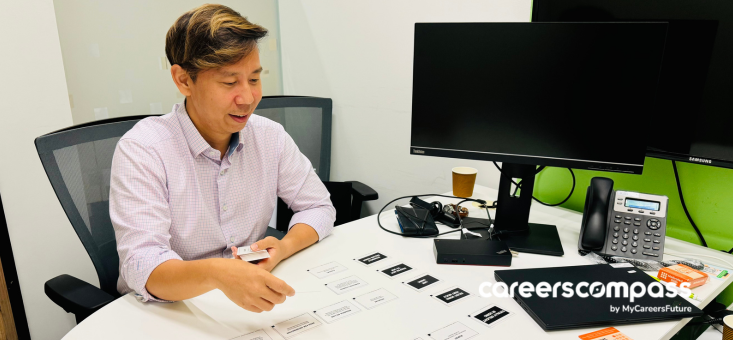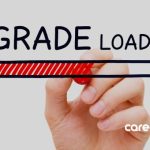Listen Here!
If you haven’t heard yet, there are personalised career programmes for employed Singaporeans who want to plan ahead and stay relevant in the job market.
Earlier last month, I had my first session of Workforce Singapore’s Polaris programme, which is designed for those who are:
-
- Exploring career opportunities;
- Seeking clarity before making crucial career decisions;
- Looking to move up in their career;
- Contemplating to hone their expertise in a specific role.
You can read how the first session went here, but here are some key takeaways that I learnt from my career coach, Joey Kang.
- I was doing fairly well in terms of being actively concerned about where my career currently is and also confident in what I was doing.
- However, it also showed that I was not particularly good at cooperating with others or working on tasks that required team consensus.
- Using the insights of a ‘Career Flow Map,’ we then mapped out my various skills and how they correlated to my personal interests and values. As Joey astutely pointed out, it made no sense for me to be in roles where I could do the job perfectly but utterly hated what I’d be doing (e.g., anything involving Microsoft Excel or PowerPoint).
Polaris Round 2: What science says I’m good at, career-wise
First and foremost, some self-praise: Joey gave me kudos for being early for my second session at the Careers Connect centre at the Lifelong Learning Institute.
Apparently, some participants tend to be a tad tardy for their sessions. Given how popular the programmes are, room and career coach bookings are quite tightly scheduled. As she said, ultimately, “the only people who lose out are the participants themselves”!
After I gave myself a pat on the back, we got down to serious business, discussing the results of my last “homework” since the first session—a profiling assessment called the Workplace Big Five.
For some context, it is an assessment that contains 93 online questions that can be completed in 15 minutes, which then reveals an individual’s 5 personality key traits and 23 sub-traits.
These traits simply and clearly explain work-related behaviours found in one’s communication styles and approaches to work, as well as preferences and energy for specific roles and tasks.
The Big Five personality can be used to understand the behavioural tendencies of individuals and their impact at work, so as to help individuals better accomplish workplace goals and objectives.
It is a framework that creates awareness and understanding of employees in any organisation, while also serving as guidance in creating a powerful and valuable workforce. It also provides insights on how individuals can contribute to teams or lead others more effectively.
Answering these 93 questions would help generate two reports: One on my career traits and another on my career competencies, which is what Joey would be running me through to better understand my professional self. Here’s what I discovered with her help:
On my career traits
Some of my key traits that came up were these below:
- Need for stability: I’m generally calm, secure and steady, though some surprises, pressures, difficult situations, and stressful circumstances can lead to worry, anger, discouragement, and other stressful responses. I have a moderate threshold for handling workplace stress.
- Extraversion: I tend to shift easily from working with others to working alone, though I would find too much of either work dissatisfying. I have a moderate threshold for sensory stimulation from my work environment.
- Originality: I lean towards a variety of interests and enjoy cutting edge technology and strategic ideas. I seek new experiences and am probably more liberal than most and enjoy theories and concepts, though I can also be perceived as impractical and easily bored.
- Accommodation: I tend to relate to others by being expressive, tough, guarded, persistent, competitive, or aggressive. I am often independent in thought and ask tough questions, but I could come across to others as hostile, rude, self-centred, or not a team player.
- Consolidation: I tend to approach goals in a relaxed, spontaneous, and open-ended fashion. I am easily capable of multitasking and being involved in many projects and goals at the same time. However, I could also be perceived as casual about responsibilities, unorganised, or less productive than others.
On my career competencies
Here’s what Joey explained were my natural fits, and what fell outside my comfort zone:
My natural fits
Action focus: I scan situations and environments for opportunities, adjustments and efficiencies, and am prepared to execute quickly and effectively.
Delegation: I enjoy taking charge and directing the work of others to accomplish goals.
Innovation: I enjoy creating and designing innovative approaches to new opportunities or complex business problems.
Leadership: I can make tough decisions in the face of challenging circumstances or incomplete information.
Learning agility: I’m energised by new experiences and perspectives that test assumptions and thinking to arrive at high-quality business outcomes.
Navigating ambiguity: I’m good at orienting myself and others to build objective and actionable understandings when faced with complexity, uncertainty or unfamiliar situations.
Presentation: I enjoy being a spokesperson, and engage audiences by delivering credible, compelling and logically crisp content.
Sales focus: I am energised by helping clients find the best solution and building long-term and collaborative relationships. I’m also naturally optimistic and persistent, blending product knowledge and listening for the best customer solutions.
Self-directed: I persevere through challenges without being prompted and am energised by continuous improvement.
Talent insight: I am passionate about spotting and placing the right person for the right role.
Vision: I enjoy creating the compelling strategic vision that spurs sustained organisational action, focusing on longer-term strategic horizons than day-to-day operational details.
Outside my comfort zone
Customer focus: I’m not energised by customer interactions or anticipating customer requests, inquiries and questions.
Engaging others: I am not genuinely curious about others’ natural capabilities, motivation, and personal goals.
Follow through: I am not energised to complete tasks in a timely and prioritised way.
Performance focus: I do not appreciate working in environments that reward achievement by defined goals and clear measures to meet deadlines and targets consistently.
Polaris helps map out career traits, strengths and weaknesses clearly
This whole process took us over an hour to unpack the Big Five report’s findings!
We also shared deeper on these findings, and whether my traits support or hinder the job and career I’m currently in.
Joey helped me realise from these findings that my key traits, social skills, leadership skills and energy, were much needed in my field of journalism, especially in navigating change. Yet, it was also clear that I leaned away from complexity in general, given my age and declining energy levels in middle age, compared to my younger days as a fresh worker.
“The traits that support your current role should be utilised more, as they’re the ones you’ll be best positioned to share knowledge on, and ideate creatively for,” she added.
My lack of interest in details also meant that I needed to be at workplaces where I would have help making sure the fine print got looked at by someone else, which made me give thanks that my current role has the pleasure of a subeditor who checks that my articles are in UK English, rather than American English (here’s a shoutout to my lovely colleague Annie for that!).
Joey also dived deeper into the Big Five report’s analysis to share that the good news was that most of my traits outside my comfort zone showed a single wave pattern (which indicates situational) rather than a flat line (which indicates consistency), which shows that I can accommodate those traits to the work environment I am in.
Floored by a single question about job security
To round off the session, she raised a question that shook my whole career planning paradigm: What is my definition of job security?
Given I’ve been working in journalism and media for almost two decades, and the ongoing changes that are ongoing in the industry, I replied fairly quickly (and smartly, I thought): “That my industry and I stay relevant, and that I can find a role within it that pays reasonably well.”
There was a moment’s silence, and Joey replied: “You do realise your industry and job function are two different things?”
She explained further that while my career traits, skills, and prior experience may well have been in journalism and media, many other industries required the same combination of skills and experience. As such, I shouldn’t regard myself as limited to only this industry, and I don’t have to stay exclusively in this industry to be able to utilise those skills.
I was amazed: I never quite looked beyond my niche prior to this discussion. She further elaborated: “I’m a coach in the public service, but frankly, I can be a coach in any other organisation that requires this skillset as well, right?”
And on that bombshell, our second session ended.
Look out for our last and final instalment on career guidance, as Joey concludes our last session of Polaris by discussing how I can incorporate these learnings into my future career planning and strategy!
Note: The writer is a Principal Manager at Workforce Singapore and received complimentary access to the Polaris career guidance programme for the purposes of this article. Polaris by WSG is available to the public for a nominal fee of $65 (subject to GST).
Follow us on LinkedIn for more expert career guidance and industry insights: Workforce Singapore LinkedIn
Stay updated with the latest trends, job market shifts and career health advice from WSG.















